(University Press of Mississippi, 208 pages, $50)
Edited by Steven Organ
 Really, half this business is putting a rectangle around things,” David Lean told writer Hollis Alpert, with characteristic self-effacement, in 1965. “Put a square around something someone is looking at and he’ll say in surprise, ‘Oh, how beautiful.’ And I don’t think it’s the photographer who provides the square. I do.” There’s Lean in a nutshell: insisting on the essential simplicity of the immensely complex, expensive and (in his late career) logistically daunting business he had chosen, while reminding us that, in the end, all the decisions, responsibilities and blame are the director’s alone. Throughout this collection of interviews and profiles (some of which are now available for the first time since their original publication), Lean reiterates his essential credo: “Never tell them what you can show them.” More surprisingly, he cautions just as often against what he refers to as “the eyeful,” the image that assaults the senses with poorly integrated “beauty for its own sake.”
Really, half this business is putting a rectangle around things,” David Lean told writer Hollis Alpert, with characteristic self-effacement, in 1965. “Put a square around something someone is looking at and he’ll say in surprise, ‘Oh, how beautiful.’ And I don’t think it’s the photographer who provides the square. I do.” There’s Lean in a nutshell: insisting on the essential simplicity of the immensely complex, expensive and (in his late career) logistically daunting business he had chosen, while reminding us that, in the end, all the decisions, responsibilities and blame are the director’s alone. Throughout this collection of interviews and profiles (some of which are now available for the first time since their original publication), Lean reiterates his essential credo: “Never tell them what you can show them.” More surprisingly, he cautions just as often against what he refers to as “the eyeful,” the image that assaults the senses with poorly integrated “beauty for its own sake.”
Lean also talks at length of film as the collaboration between cameraman and editor. His late-1920s apprenticeship as an editor of newsreels and features was profoundly influential on his ever-widening cinematic eye. “You learn more in the cutting room,” he says, “than in any other department of the studio because you see everything that’s being done.” As a mature director, Lean felt all moviemaking ultimately depended on the right script, properly developed, and on one’s willingness to serve its needs, through the agency—and the unity—of lens and cutter’s blade.
In these interviews, well chosen by editor Steven Organ, Lean also addresses the perceived divide between his early, intimate British work and his later, expansive inter-national epics. He considered the comparison of Brief Encounter versus Lawrence of Arabia, for instance, an artificial argument his critics insisted on all his life. Putting a rectangle around something, as his other remarks suggest, was just the beginning.
Review written by John Patterson.